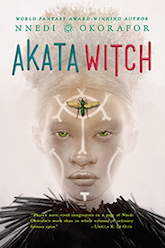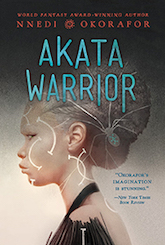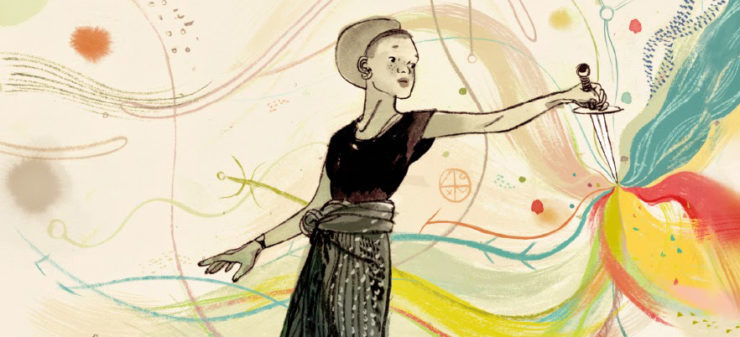Hey you! Yeah, you. C’mere and take a seat. I’m about to tell you about a fantastic middle grade/young adult series by the amazing Nnedi Okorafor. The Akata Witch series is an electrifying tale about an inspiring African girl. It’s gorgeously written and filled with magic, excitement, and even a little romance. It beats the Chosen One trope at its own game with the help of West African deities and socio-cultural traditions. I know I always say “you need to read this,” but you really need to read this.
Sunny Nwazue is an albino girl born in America to Nigerian parents who returned to their homeland when she was young. At first, the transition is hard. Some of the girls at school call her “akata,” a derogatory term for African Americans, her father is almost oppressive in his patriarchy, and her brothers would rather flirt with girls than hang out with her. At 12 she sees the world coming to an end in the flame of a candle and discovers she’s the heir to powerful magic. Her new friends – pensive Orlu, feisty Sasha, and confident Chichi – yank her out of the world of the Lambs (regular ol’ humans) and into the world of Leopard people (humans with the ability to do magic) and the mystical, mythical beings they interact with. She is only a free agent, a mage born to non-magical parents, but there’s more magic in her family tree than she realizes.
Buy the Book


Akata Witch
One by one the children become apprentices to important Leopard people to hone their specific magical talents. As they learn, they earn chittim and rise in the educational hierarchy of their society. In Akata Witch, Sunny confronts a child-killer known as Black Hat Otokoto and her own insecurities. By the time Akata Warrior rolls around she’s brave enough to challenge a soul-stealing djinn, a lake monster with a grudge, and an ancient deity with a deadly vendetta. Strong, complex women and supportive, kind men ground her magical education and push her to grow her skills as a free agent. And always at Sunny’s side, even when she thinks she’s alone, is her spirit face, Anyanwu.
Akata Witch and Akata Warrior are frequently referred to as the Nigerian Harry Potter. Sure, she’s a Chosen One brimming with powerful ancestral magic who was raised in the non-magical world. And yes, her destiny is to battle a great evil with the help of her generous friends. But in Sunny’s story there’s a realness and harsh earnestness that HP lacks. Leopard People aren’t unforgiving but won’t let a crime go unpunished. Death and pain lurk in the shadows of her world, not just in the form of her nemesis but in everyday life. Africa is a continent marred by colonialism and exploitation; to build a magical world on that foundation is to imbue it with hardship. But the Akata Witch series isn’t dour and dark. Hope and happiness win out every time. Life is worth living because even in the darkest times, friends and family make everything better. Magic doesn’t make Sunny’s world better, it just changes the way she engages with it.
Sunny’s very existence confounds stereotypes. She is the embodiment of the in between. She’s Black but with pale skin, hair like “sour milk,” and “hazel eyes that look like God ran out of the right color.” At once Igbo and American, a confluence that leaves her feeling outside both identities. Her physical strength and sporty prowess makes her feel like a warrior, but society (Leopard and Lamb) discounts her abilities because of her gender. She’s no longer a child but not yet a teenager, a Leopard Person with a powerful genealogy and a great destiny but still disregarded as a lowly free agent. Watching her discover that what she thinks are contradictions are really complements and that she can determine her own fate is the best part of the series.
Buy the Book


Now, I’m not Nigerian, nor am I albino, but as a light-skinned biracial Black girl raised in a predominately white area, I grew up surrounded by people who didn’t look like me and who went out of their way to point that out as often as possible. And as much as I wish I had Sunny Nwazue when I was a tween, it’s thrilling to think about all those kids who get to have her now. If we adults do our jobs right and promote Sunny as much as we do Harry, there will be a whole generation of kids who will grow up with the memory of Sunny breaking free of the chains of the patriarchy and defining herself on her own terms. Every teenager has felt in between at some point in their life, but not everyone knows what to do about it. Sunny shows them (especially Black girls) that they don’t have to be beholden to what society wants, that they can make their own way, even if adults don’t necessarily agree with their choices.
It’s worth taking a moment to discuss how the Akata Witch series treats disabilities. I think it’s fair to argue that Okorafor was mostly successful in turning the tables on the mystical disability trope. In her series, what a Lamb might consider a disability or a flaw is, for Leopard people, the basis for their magical abilities and a highly respected quality. But as Sunny becomes more powerful, her disability becomes less apparent. By the end of Akata Warrior, pretty much the only reminder we have of her albinism is her light skin, hair, and eyes. Most of the accompanying side effects like photophobia and issues with exposure to sunlight are more or less cured by her magic. On one hand, if we look at Sunny’s albinism as the physical manifestation of her magic, it makes sense that it would change as she grows into her powers. On the other hand, it also kinda turns her disability into decoration and strips most of the meaning from it.
Maybe how the Akata Witch series deals with disabilities works and maybe it doesn’t and maybe it’s a little of both. Maybe, like Sunny herself, there is no right or wrong but something in between. And that’s ok. But it’s also ok to want more than that. I trust Okorafor enough to believe her intent came from a place of respect, and I always say I’d rather have representation that tries but doesn’t quite stick the landing than to not try at all to the point of exclusion.
Nnedi Okorafor’s Akata Witch series isn’t perfect, but it’s damn near close. It’s everything I’ve always wanted from MG/YA fantasy fiction. Y’all can keep mining the same old wizards and dragons well. Okorafor and I will be over here freaking out over Igbo deities and West African cultural customs. I hope to Chukwu there’s a third book on the horizon, but I wouldn’t say no to a fourth or a fifth or a sixth or…
Alex Brown is a teen librarian, writer, geeknerdloserweirdo, and all-around pop culture obsessive who watches entirely too much TV. Keep up with her every move on Twitter and Instagram, or get lost in the rabbit warren of ships and fandoms on her Tumblr.










